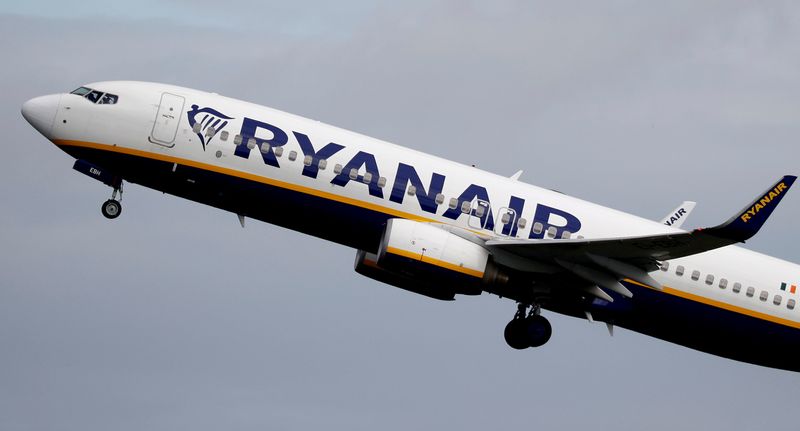DUBLIN (Reuters) – Ryanair <RYA.I> plans to cut significantly fewer jobs than the 3,000 it originally estimated, after 97% of pilots and over 90% of cabin crew have signed up so far to pay cuts and work practice changes, its director of operations said on Friday.
Europe’s biggest budget airline had warned it would have to cut one in five of its pilots and cabin crew if they did not agree to pay cuts of up to 20% after the COVID-19 crisis ravaged its business.
The Irish airline struck a pay deal with Spanish pilots on Thursday, leaving agreements outstanding with pilots in Belgium and cabin crew in Italy and Germany.
“We haven’t finalised the number yet, we originally said there was going to be 3,000 redundancies but we have been able to reduce that significantly,” Neal McMahon told Reuters in a telephone interview.
“Broadly speaking they (pilots and cabin crew) recognise the grim situation we are in and they have been pragmatic.”
Ryanair’s Italian cabin crew union has put an agreement out to ballot, while there were further talks in Germany on Friday and the airline is in the middle of a collective redundancy process in Belgium, Ryanair People Director Darrell Hughes said.
While cabin crew in Spain failed to join pilots in agreeing terms this week, the collective bargaining system there allows Ryanair to implement the changes and Hughes was confident its position would stand up to challenge.
The executives added the airline had managed its pilot numbers without redundancies to date through a mixture of voluntary part time work, voluntary unpaid leave and spreading shifts around.
Low-cost rival easyJet <EZJ.L> confirmed the loss of up to 670 jobs this week, part of a planned total of 4,500 that will also likely be trimmed due to agreements on part time contracts, base transfers and unpaid leave.
British Airways, owned by IAG <ICAG.L>, said in April it would need to axe up to 12,000 of its 42,000 staff to survive.
Ryanair this week reduced its capacity by a further 20% for September and October after a reimposition of some travel restrictions hit bookings.
McMahon and Hughes said the number of redundancies would depend on how winter booking fare and how much the pandemic disrupts travel next year. Ryanair increased flights to 60% of its normal schedule this month after resuming services in July.
“Airlines have for a long time relied on business traffic, visiting friends and relatives and maybe an older non-family market for travel in September, October, November,” Hughes said.
“It’s a big question as to what that level of demand is going to be, but it’s not looking good at present.”
(Reporting by Padraic Halpin; Editing by Susan Fenton and Mark Potter)






















